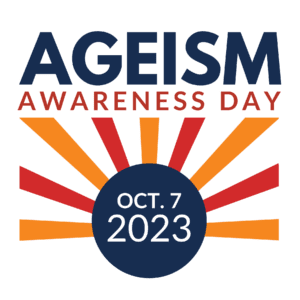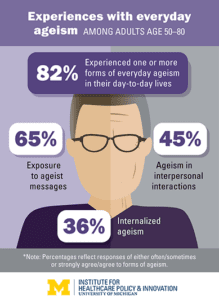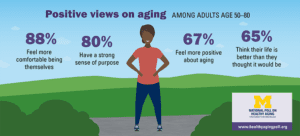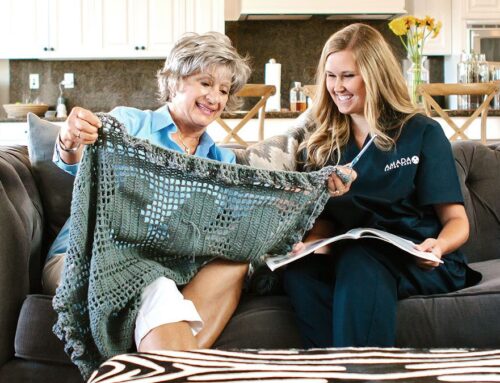In providing nonmedical caregiving services to their communities, Amada Senior Care franchise owners witness the diverse experiences and challenges that aging individuals face every day. As senior advocates, we recognize ageism as a prevailing health issue our society needs to address and do more to overcome. Ageism Awareness Day this Saturday serves as a reminder of ageism’s existence and its impact and invites us to take the needed steps to redefine what aging is.
and challenges that aging individuals face every day. As senior advocates, we recognize ageism as a prevailing health issue our society needs to address and do more to overcome. Ageism Awareness Day this Saturday serves as a reminder of ageism’s existence and its impact and invites us to take the needed steps to redefine what aging is.
Why is it important to understand ageism and confront any ageist attitudes? Challenging ageism benefits all of us because feeling discriminated against because of age can impact many areas of our lives, including self-esteem, physical health, finances, and even longevity.
Many studies show the serious impact ageism can have on older adults and seniors as they age. The World Health Organization (WHO) reports that “ageism is associated with poorer physical and mental health, increased social isolation and loneliness, greater financial insecurity, decreased quality of life and premature death.”
 The University of Michigan’s National Poll on Healthy Aging showed that “36% of adults age 50–80 endorsed at least one form of internalized ageism based on their agreement that feeling lonely (29%) or feeling depressed, sad, or worried (26%) are a normal part of getting older.”
The University of Michigan’s National Poll on Healthy Aging showed that “36% of adults age 50–80 endorsed at least one form of internalized ageism based on their agreement that feeling lonely (29%) or feeling depressed, sad, or worried (26%) are a normal part of getting older.”
Understanding Ageism
Ageism is defined as discrimination based on age, specifically against elderly individuals. It manifests as negative stereotypes, generalizations, and attitudes towards older adults, which can result in unequal treatment, rejection, and isolation. According to WHO, “ageism refers to the stereotypes (how we think), prejudice (how we feel), and discrimination (how we act) towards others or oneself based on age.” Ageism not only affects the way society perceives and treats older adults, but it also impacts their self-esteem, mental health, and overall well-being.
The Privilege of Aging: Why It Matters
It’s time to reframe our mindset around aging and recognize the privilege it offers. In a world where many people are not fortunate enough to live long enough to experience the full range of life’s challenges and rewards, aging is indeed a gift. Here are some reasons why aging should be celebrated:
Wisdom and Experience. As we age, we collect a wealth of knowledge and experience that enriches our lives. Older adults possess skills honed over a lifetime and have often faced countless trials and tribulations, from which valuable lessons have been learned.
Legacy. Aging affords us the opportunity to leave a legacy, to pass on our knowledge, values, and life experiences to future generations and leave a lasting impact on the world.
Deeper Relationships. Over time, we can develop more profound connections with the people around us. As we age, relationships often become deeper, more meaningful, and rich in emotional support.
Personal Growth. Our journey through life allows us to continuously evolve, adapting and growing through the various experiences life has to offer. Aging is a unique opportunity to continue expanding our horizons and become our best selves.
The Impact of Overcoming Ageism on Health and Longevity
Overcoming ageism is crucial not only for changing societal attitudes but also for improving the health and longevity of older adults. Research has shown that negative stereotypes surrounding aging can lead to increased stress and poor health outcomes for elderly individuals. By addressing and challenging ageism, we can create more positive attitudes towards aging, which can have numerous benefits for the health and well-being of older adults, like the following:
Improved Mental Health. Studies have shown that positive views on aging can lead to better mental health, lower rates of depression, and a more optimistic outlook on life.
Greater Social Support. When we eliminate ageist attitudes, older adults can experience more social connections and foster deeper relationships, which are essential for emotional support and well-being.
Increased Longevity. Positive attitudes towards aging can promote healthier lifestyle choices and a more active approach to life. Research has found that those who maintain an active lifestyle and have positive views about aging experience increased longevity.
Better Overall Health. Breaking down ageist stereotypes can lead to improved access to healthcare, greater participation in health-promoting activities, and fewer instances of self-neglect, all of which contribute to better overall health for older adults.
What Steps Can We Take to Challenge Ageism?
Ageism is a form of discrimination that can affect anyone, regardless of their age. “Addressing everyday ageism may have far-reaching benefits for the health and well-being of older adults,” concluded the University of Michigan’s Institute for Healthcare Policy and Innovation. Here are five action steps to challenge and combat ageism:
Educate Yourself and Others. Understand what ageism is and how it impacts different people. Awareness is the first step to any kind of change. Share this information with friends, family, and co-workers.
Challenge Stereotypes. Ageist stereotypes are often reinforced in media and everyday conversations. Challenge these stereotypes when you see or hear them. Promote images and stories of older people leading full, active lives.
Promote Intergenerational Interaction. Encourage relationships between younger and older people. This could be through structured programs at work or school, or informally within your own social or family circles.
Advocate for Age-Inclusive Policies. Fight for policies that don’t discriminate based on age. This could be in the realm of employment, housing, healthcare, education, or any other area.
Practice Empathy and Respect. Treat all individuals, regardless of age, with dignity and respect. Empathy allows us to understand and share the feelings of others, powerful in combating ageism.
Remember on this Ageism Awareness Day and throughout the year, it’s never too late or too early to start challenging ageism.




